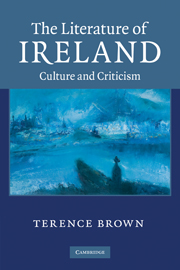Book contents
- Frontmatter
- Contents
- Acknowledgements
- Introduction
- 1 The Literary Revival: historical perspectives
- 2 Joyce's magic lantern
- 3 Music: the cultural issue
- 4 Modernism and revolution: rereading Yeats's ‘Easter 1916’
- 5 Shakespeare and the Irish self
- 6 Irish literature and the Great War
- 7 Ireland, Modernism and the 1930s
- 8 Post-modernists: Samuel Beckett and Flann O'Brien
- 9 Patrick Kavanagh: religious poet
- 10 MacNeice's Irelands: MacNeice's islands
- 11 Louis MacNeice and the Second World War
- 12 MacNeice and the puritan tradition
- 13 John Hewitt and memory: a reflection
- 14 Michael Longley and the Irish poetic tradition
- 15 Seamus Heaney: the witnessing eye and the speaking tongue
- 16 Derek Mahon: the poet and painting
- 17 Telling tales: Kennelly's Cromwell and Muldoon's ‘The More a Man Has the More a Man Wants’
- 18 Redeeming the time: John McGahern and John Banville
- 19 ‘Have we a context?’: transition, self and society in the theatre of Brian Friel
- 20 Hubert Butler and nationalism
- 21 The Irish Dylan Thomas: versions and influences
- Index
- References
6 - Irish literature and the Great War
Published online by Cambridge University Press: 05 June 2012
- Frontmatter
- Contents
- Acknowledgements
- Introduction
- 1 The Literary Revival: historical perspectives
- 2 Joyce's magic lantern
- 3 Music: the cultural issue
- 4 Modernism and revolution: rereading Yeats's ‘Easter 1916’
- 5 Shakespeare and the Irish self
- 6 Irish literature and the Great War
- 7 Ireland, Modernism and the 1930s
- 8 Post-modernists: Samuel Beckett and Flann O'Brien
- 9 Patrick Kavanagh: religious poet
- 10 MacNeice's Irelands: MacNeice's islands
- 11 Louis MacNeice and the Second World War
- 12 MacNeice and the puritan tradition
- 13 John Hewitt and memory: a reflection
- 14 Michael Longley and the Irish poetic tradition
- 15 Seamus Heaney: the witnessing eye and the speaking tongue
- 16 Derek Mahon: the poet and painting
- 17 Telling tales: Kennelly's Cromwell and Muldoon's ‘The More a Man Has the More a Man Wants’
- 18 Redeeming the time: John McGahern and John Banville
- 19 ‘Have we a context?’: transition, self and society in the theatre of Brian Friel
- 20 Hubert Butler and nationalism
- 21 The Irish Dylan Thomas: versions and influences
- Index
- References
Summary
In 1979, ten years after the modern Irish ‘troubles’ broke out, Seamus Heaney included in his volume Field Work a poem entitled ‘In Memoriam Francis Ledwidge’. In so doing he was invoking an iconic figure, almost the only Irish poet who might be included among the soldier poets who died in the First World War and who made that conflict seem in cultural memory, a poet's war. In his poem Heaney ponders how it can seem an enigma in the late twentieth century, in the midst of a conflict between loyalism and Irish republicanism, that a nationalist Irishman should have been among the British soldiery who perished in the Great War, among whom, we remember, were such renowned war poets as Julian Grenfell, Isaac Rosenberg and Wilfred Owen. Heaney designates Ledwidge ‘our dead enigma’ and recalls his County Meath origins, the tender Georgian pastoralism of his verses, and quotes from a letter written by Ledwidge shortly before his death in action in France at the Battle of Passchendale, on 31 July 1917. In that letter the poet, serving in the King's uniform in the Royal Inniskilling Fusiliers, had regretted that ‘party politics should ever divide our tents’ and hoped for a time when a new Ireland would ‘arise from her ashes in the ruins of Dublin, like the Phoenix, with one purpose, one aim and one ambition.
- Type
- Chapter
- Information
- The Literature of IrelandCulture and Criticism, pp. 75 - 87Publisher: Cambridge University PressPrint publication year: 2010



